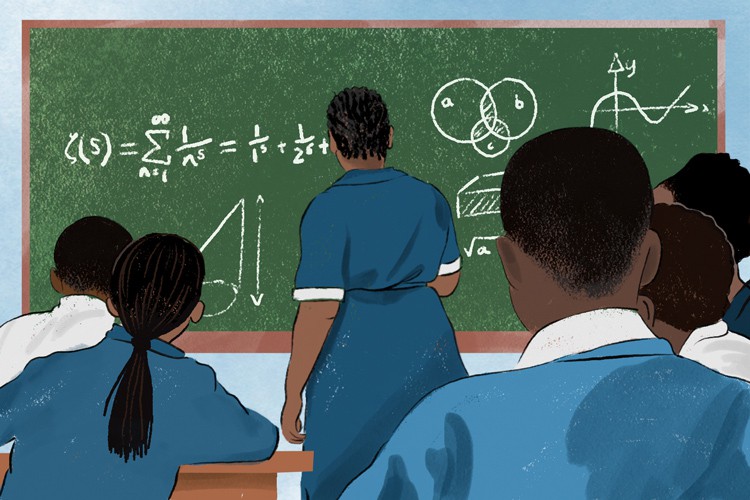Xenophobia alive in some schools, human rights meeting is told
Matric children of immigrants born in South Africa also battle to get IDs so that they can enrol in tertiary education, but Home Affairs is trying to fix this
Illustration: Lisa Nelson
Children of African immigrants to South Africa experience prejudice and victimisation from their peers at certain schools, some told a virtual meeting against xenophobia in schools on Saturday.
Human rights organisation Africa Unite hosted the event attended by 20 representatives from schools in Gauteng, KwaZulu-Natal, and the Western Cape. The meeting aimed to enhance cohesion between local and immigrant learners and build empathy, unity, and peace. It included testimonies from immigrant learners and poems read by South African learners.
Shalom, whose parents were Zimbabwean, (her mother died when Shalom was two years old) goes to school in Mitchells Plain. “Even though I can speak both Xhosa and English, it is hard sitting in the class and having to deal with being mocked … to apologise for being myself.”
“It was difficult to try not to be South African at home and at the same time try not to be too Zimbabwean at school. I felt like I was losing myself, not knowing who I am.”
She said she had been shaken by a conversation among her classmates who said that foreigners should leave South Africa. “I had to constantly look at the door when my father left for work and pray that nothing happens to me.”
Farayi (we are only using first names), also from Zimbabwe, enrolled in school in Bloekombos, said she learned to communicate in Xhosa, but she was “still a target”. “I feel like an outsider most of the time. If I had an option to leave I would definitely leave, that is how deeply I feel.”
Teachers too can be treated disrespectfully and made fun of if they are African immigrants, said Lindiwe, a grade 10 student at a Catholic school in Cape Town.
GroundUp contacted the head of her school who said she was aware of an incident last year in April. “There was a teacher from Zimbabwe and children had been making fun of her accent. This was brought to my attention and we dealt with the situation, making it absolutely clear that that is completely unacceptable, and that kind of behaviour will not be tolerated.”
“All the girls were made to apologise; most importantly they were all sanctioned and given a level of punishment as part of their learning process,” she said.
South African-born children of immigrants said they had also been struggling to enrol in tertiary education as Home Affairs had left them in limbo under the Covid-19 lockdown. Home Affairs has sought to remedy this through online applications.
Guest speaker Karolyn Mujinga, whose parents are from the DRC, spoke about her struggle to get registered. “I turned 18 in 2021 but could not apply for citizenship due to Covid-19 [lockdown] … Home Affairs only made provision for South Africans to apply for their ID, not undocumented South African-born refugees, who’ve waited until they turned 18, which is a requirement to apply for citizenship.”
“Many other refugee children and I are in limbo, unable to apply for university, unable to apply for bursaries, register for university and closing dates are drawing near. I still have no form of any identification and an unabridged birth certificate won’t help.”
She started a petition on 20 June calling on Home Affairs to make provision for refugee children born in South Africa to apply for identity documents. The petition garnered 25,000 signatures.
Subsequently, Home Affairs has issued a circular invitation “to dependants of refugees who are in matric or wish to further studies or have an employment offer, to apply for IDs or travel documents” online.
Spokesperson of the Minister of Home Affairs Siya Qoza said this was circulated on 8 July. Dependants of refugees should send an email request to enabledocument.asm@dha.gov.za with supporting documents such as letter from school or letter of acknowledgement or admission from a institution of higher learning.
An automatic reply would be sent to the applicant with the date, time and office where the applicant should go to complete the application.
Next: Community comes to the aid of Durban fire victims
Previous: Life Esidimeni inquest will determine if health officials could be criminally convicted
© 2021 GroundUp. This article is licensed under a Creative Commons Attribution-NoDerivatives 4.0 International License.
You may republish this article, so long as you credit the authors and GroundUp, and do not change the text. Please include a link back to the original article.
We put an invisible pixel in the article so that we can count traffic to republishers. All analytics tools are solely on our servers. We do not give our logs to any third party. Logs are deleted after two weeks. We do not use any IP address identifying information except to count regional traffic. We are solely interested in counting hits, not tracking users. If you republish, please do not delete the invisible pixel.



